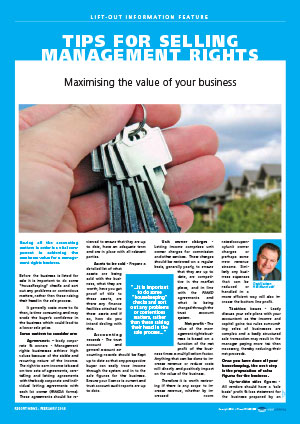
How to select a professional finance broker
In the current climate there are about eight banks that lend to the management rights industry and competition is still strong if you know where to look.
 |
| Daniel Green, Green Finance Group |
 |
| Click here to download as a PDF |
Whether you are new to the industry or an existing operator looking at your refinancing options getting a better finance deal comes down to getting the right people working hard for you.
Finance brokers are a critical piece of the business jigsaw puzzle and the good ones know how important their role is in making sure your business is set up for success from the outset. Ensuring that a finance broker is right for your business and has the experience and qualifications, as well as being committed to the industry code of practice is vital. Use the following as a guide to help you establish whether your finance broker is ‘the one’.
Knowledge is key
All too often clients fall into the trap of utilising their existing broker or banker to source management rights finance only to discover, too late, their lack of experience can get them into trouble. It’s critical to source a finance broker who has excellent product and policy knowledge and is experienced in the management rights industry.
Lenders change their policy on a regular basis so it’s paramount your finance broker is across lender updates and knows which bank or secure lender is more readily able to discount or provide additional benefits and suitable terms for your business.
When you’ve only got one chance to get it right, you want to make sure it’s the first time.
The power of the panel
Use a professional finance broker who can prove strong working relationships with a range of banks and secure lenders (also known as the panel of lenders) and can pinpoint which financiers will be supportive of your business. Ensure they are not just an agent for one lender.
Additionally, in some cases, a broker with a reputation for quality loan submissions and high volumes of business often receives preferential treatment from the lenders in the form of ‘fast-tracked response times’ or direct access to decision makers. This can make all the difference if you are on a tight timeframe or when negotiating a deal that may not tick all of the boxes.
Get a negotiator on your side
When it comes to selecting a professional finance broker you want someone who is going to work hard for you, someone in your corner. It stands to reason that a good third party negotiator normally gets a better result.
An experienced management rights broker will be armed with the knowledge of each lender’s competitor offerings. This is an important advantage when the lender knows your broker’s job is to work to get you the best rate and business terms they can. In the case of an existing management rights business, this positioning makes it entirely possible that your broker can help you get a better deal, even with your current lender.
Breadth of experience
Management rights are valued and sold using a ‘multiplier’ of annual net income or profit.
As an example, a net profit of $100K at a multiple of three times would produce a $300k price tag for the business. If the manager’s unit is valued at $450K then the total package price would equate to $750k.
How is a multiplier set? The size of the multiplier is directed heavily by market conditions that include the influence of banks and associated valuers. Typically the multiple ranges anywhere from 2.5 to 5.5 and can depend on:
- Location
- Age and size of property
- Occupancy rates
- Agreement term
- Market demand
- Legislation (existing or pending)
- Income composition (letting vs maintenance)
- Interest rates
With so many variables it is unlikely any two management rights transactions will ever be the same. Be sure to ask your finance broker or bank manager how many management rights transactions they have successfully completed and whether they have any comparative business case studies.
Commitment
It’s no secret your broker will be paid a trail commission from the lender (which they should disclose to you at the point of application), so you want to make sure they are going to work for their money; ask them how they plan to add ongoing value to your business after the deal is done?
Even once your loan is settled a good finance broker will provide an ongoing service acting as your key resource for questions or concerns and providing you with regular business reviews. This could be quarterly, every six months or annually depending on your individual business and includes acting as a mediator between you and the bank in the event further negotiation is required.







